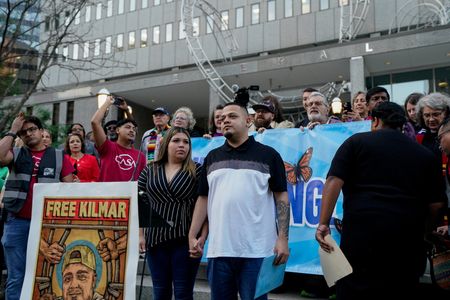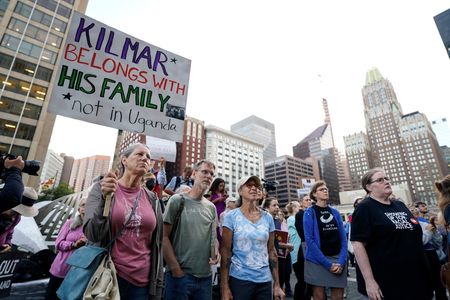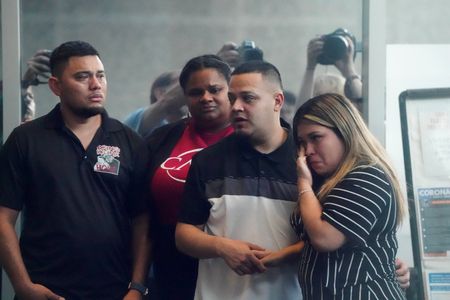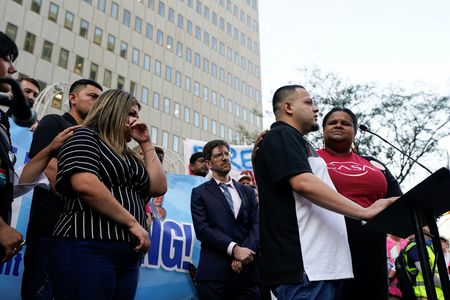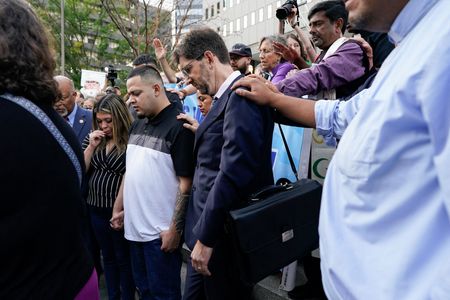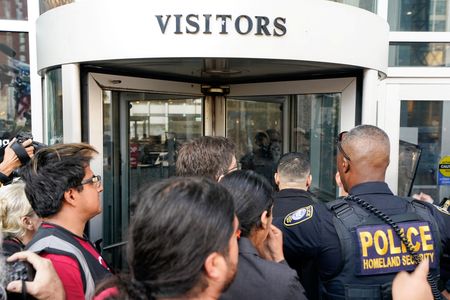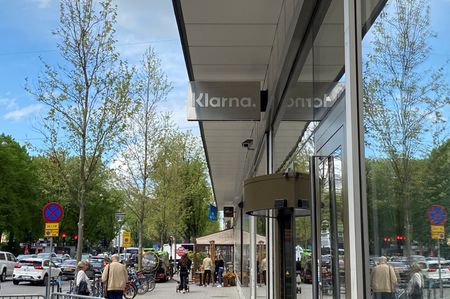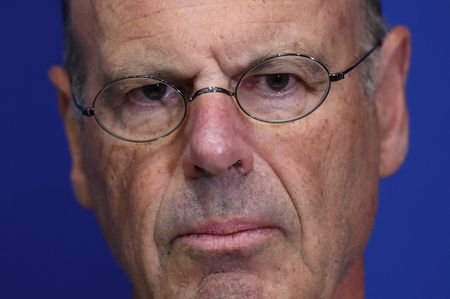By Daniel Trotta, Luc Cohen and Andrew Goudsward
WASHINGTON (Reuters) -Kilmar Abrego, the migrant whose wrongful deportation to his native El Salvador made him a symbol of President Donald Trump’s immigration crackdown, was detained again by U.S. immigration officials in Baltimore on Monday and may be deported a second time, this time to Uganda.
The Trump administration’s push to deport Abrego, 30, to an African country where he has no ties is the latest twist in a saga that began in March, when U.S. authorities mistakenly sent him to El Salvador. Abrego was brought back in June to face criminal charges of transporting migrants living in the United States illegally and was released on bond on Friday.
He has pleaded not guilty and his lawyers have accused the administration of vindictive prosecution. He also has denied the administration’s claims that he is a gang member.
Abrego, 30, was arrested at an Immigration and Customs Enforcement field office in downtown Baltimore, where he reported for a scheduled interview on Monday morning, and then was sent to a detention facility in Virginia.
During a hearing conducted by telephone on Monday afternoon, Greenbelt, Maryland-based U.S. District Judge Paula Xinis said she planned to hold additional court proceedings on the administration’s plan to deport Abrego to Uganda. The judge barred the government from removing him until such a hearing could be held.
Abrego’s lawyers asked Xinis to prevent him from being deported again without the due process required under the U.S. Constitution. The judge voiced concern that the government had not offered assurances that Abrego would not be imprisoned in Uganda or sent back to El Salvador. Xinis said there was “an absence of process” around resolving Abrego’s immigration claims to remain in the United States.
“I just have nothing on the record that suggests defendants (the government) are taking that in good faith and operating as they should,” the judge said.
Drew Ensign, a Justice Department lawyer, told the judge that Abrego’s deportation was not imminent and that so-called third-country removals – sending deportees to countries other than the one where they have citizenship – often take some time to execute.
After being detained in Baltimore earlier in the day, Abrego was being held at an ICE detention center in Farmville, Virginia, according to the agency’s online detainee locator. Xinis ordered the Trump administration to keep Abrego there at least overnight to preserve access to his attorneys.
Abrego, a sheet metal worker who entered the United States illegally, had been living in Maryland with his wife, their child and two of her children – all of whom are American citizens – when he was arrested and sent to El Salvador.
His lawyers have said the administration’s handling of the case is indicative of the Republican president’s push to expand executive power in immigration matters at the expense of due process mandated by the U.S. Constitution. Trump’s administration has said aggressive deportations are needed after years of insufficient enforcement, including under his Democratic predecessor, Joe Biden.
His U.S. citizen wife, Jennifer Vasquez, and his brother Cesar accompanied Abrego to the ICE field office on Monday morning, where a crowd of supporters greeted him with chants of “Si se puede” – Spanish for “Yes we can.”
“When I was detained, I always remembered beautiful moments with my family, like going to the park or going to the trampoline with my children,” Abrego said while choking up. “Those moments will give me strength and hope to keep fighting.”
A CARROT-AND-STICK APPROACH
Abrego’s lawyers have accused the administration of using a carrot-and-stick approach to try to coerce him to plead guilty to criminal charges of transporting migrants living illegally in the United States. His trial is scheduled for January.
According to court filings, the administration had offered to deport him to Costa Rica – a Spanish-speaking country in Central America, like El Salvador – if he agreed to change his plea to guilty, but plans to deport him to Uganda if he does not.
In a call with reporters on Monday afternoon, Abrego’s attorney Simon Sandoval-Moshenberg said Abrego had notified the U.S. government that he would accept deportation to Costa Rica since the country had said it would provide him refugee status, but did not say whether he would agree to plead guilty to U.S. criminal charges.
Sandoval-Moshenberg said Abrego could not lawfully be deported elsewhere without assurances that he would not be sent back to El Salvador, where he fears persecution.
“We don’t know if Uganda will even let him walk around freely in Kampala or whether he’ll be inside of a Ugandan jail cell,” Sandoval-Moshenberg said.
Abrego’s lawyers have acknowledged they have entered plea discussions with the government to possibly avoid deportation to Uganda.
‘COMPLETELY UNCONSTITUTIONAL’
Andrea Flores, a former top immigration official under Biden, said on the call that the Trump administration’s threat of deportation to Uganda amounted to retribution for fighting his earlier removal to El Salvador.
“There is no legal, public safety or national security reason for this retaliatory deportation,” Flores said.
Before Abrego’s detention on Monday, he embraced his wife in the ICE field office’s lobby before passing through a security checkpoint. About 45 minutes later, his wife and brother left the building without him.
Abrego was deported despite a 2019 U.S. immigration court ruling that he not be sent back to his native country due to a risk of persecution by gangs.
Abrego was flown back from El Salvador in June to face the charges brought by federal prosecutors in Nashville, Tennessee. Administration officials have called him a “monster,” pointing to a protective order his wife filed against him in 2021.
“We’ve got him under control. He will no longer terrorize our country,” Attorney General Pam Bondi told reporters at the White House on Monday.
Trump said Democrats wrongly thought that supporting Abrego would help them win over voters, calling him an “animal” and referencing allegations of violence lodged by his wife in the 2021 protective order.
After his release on Friday, Abrego returned to a family home in Maryland after more than five months of detention, including time in a mega-prison in El Salvador known for its harsh conditions. Video posted to social media by immigrant rights advocacy organization CASA on Friday night showed him entering a room where his family was waiting, setting down a bouquet of flowers and embracing his wife.
(Reporting Daniel Trotta in Carlsbad, California and Luc Cohen in New York; Editing by Caitlin Webber, Toby Chopra, Chizu Nomiyama, Noeleen Walder, Mary Milliken and Will Dunham)

